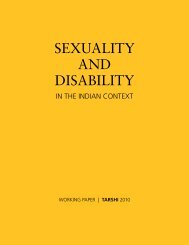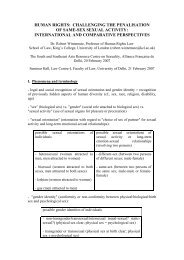People with Disabilities in India: From Commitment to Outcomes
People with Disabilities in India: From Commitment to Outcomes
People with Disabilities in India: From Commitment to Outcomes
You also want an ePaper? Increase the reach of your titles
YUMPU automatically turns print PDFs into web optimized ePapers that Google loves.
accepted by the community; (ii) poor perception of the disease and the benefits of the control<br />
program; and (iii) drug compliance was not at a level <strong>to</strong> <strong>in</strong>terrupt transmission <strong>in</strong> many states.<br />
3.25. (e) Prevention <strong>in</strong> the general health care system: The above experiences<br />
<strong>in</strong>dicate some success <strong>in</strong> <strong>India</strong> is reduc<strong>in</strong>g the <strong>in</strong>cidence of disabl<strong>in</strong>g communicable diseases.<br />
However, successes <strong>in</strong> reduction of some communicable diseases have not been matched by<br />
progress <strong>in</strong> the broader public health system <strong>in</strong> several key areas which have significant<br />
impacts on disability. One example is <strong>in</strong> programmes address<strong>in</strong>g micronutrient deficiencies,<br />
where <strong>India</strong> ma<strong>in</strong>ta<strong>in</strong>s the “South Asian curse” of stubbornly poor nutritional outcomes for its<br />
population. Irreversible debilities can arise from both mother’s anemia and <strong>in</strong> nutritional<br />
deficiencies <strong>in</strong> childhood, and children from poor families are at particular risk (e.g. vitam<strong>in</strong> A<br />
deficiency is a cause of bl<strong>in</strong>dness; iod<strong>in</strong>e deficiency disorders (IDD) are preventable causes of<br />
mental retardation). National programs <strong>to</strong> deal <strong>with</strong> iod<strong>in</strong>e, iron and Vitam<strong>in</strong> A deficiency have<br />
been <strong>in</strong> existence for some time. Despite this, UNICEF reports that approximately only 45<br />
percent children from 6-59 months were covered by Vitam<strong>in</strong> A supplementation <strong>in</strong> 2003 and only<br />
half of all households consumed iodized salt <strong>in</strong> the period 1998-2004. 61 However, IDD is a<br />
problem <strong>in</strong> every part of <strong>India</strong>. Of 286 districts <strong>in</strong> the endemic states surveyed by the M<strong>in</strong>istry of<br />
Health and Family Welfare <strong>in</strong> 1998, IDD was endemic <strong>in</strong> 242. 62 Coverage of these programs is<br />
<strong>in</strong>tr<strong>in</strong>sically related <strong>to</strong> coverage of other maternal and child health programs and draws attention<br />
<strong>to</strong> the l<strong>in</strong>ks between overall health goals and prevention of disability. In this regard, a positive<br />
development <strong>in</strong> 2005 was the re-bann<strong>in</strong>g of non-iodized salt by GoI<br />
3.26. Children from poor households are at greater risk of malnutrition-<strong>in</strong>duced disabilities. In<br />
addition, CWD may also be at greater risk of malnutrition if their there is relative neglect of their<br />
feed<strong>in</strong>g, and/or their disability contributes <strong>to</strong> problems <strong>with</strong> feed<strong>in</strong>g. F<strong>in</strong>d<strong>in</strong>gs of a study<br />
explor<strong>in</strong>g the impacts of malnutrition among children <strong>in</strong> the Dharavi slum of Mumbai show: 63<br />
• mean weight for age of children <strong>with</strong> disabilities was significantly lower compared <strong>to</strong><br />
their sibl<strong>in</strong>gs.<br />
• CWD had significantly lower mean hemoglob<strong>in</strong> levels compared <strong>with</strong> sibl<strong>in</strong>gs.<br />
• CWD <strong>with</strong> feed<strong>in</strong>g difficulties were significantly more likely <strong>to</strong> be malnourished us<strong>in</strong>g<br />
all <strong>in</strong>dica<strong>to</strong>rs, compared <strong>to</strong> disabled children <strong>with</strong>out feed<strong>in</strong>g difficulties.<br />
3.27. A second critical area of the general health system that has major impacts on<br />
m<strong>in</strong>imization of disability is reproductive, maternal and child health. This relates not only <strong>to</strong><br />
young children themselves but also <strong>to</strong> mothers. There is a large body of literature that<br />
underscores the importance of maternal fac<strong>to</strong>rs such as education, nutrition and health care for<br />
child health outcomes. However, access <strong>to</strong> care dur<strong>in</strong>g pregnancy and delivery is poor <strong>in</strong> <strong>India</strong>.<br />
In the three years preced<strong>in</strong>g <strong>India</strong>'s National Family Health Survey 1998-99 (NFHS-2), only 35<br />
percent of pregnant women received no antenatal care: a marg<strong>in</strong>al improvement on the 36 percent<br />
<strong>in</strong> the 1992-93 NFHS. 64 The survey showed that the women who failed <strong>to</strong> seek care tended <strong>to</strong> be<br />
older (ages 35 <strong>to</strong> 49), <strong>with</strong> a high number of previous pregnancies, and were illiterate and socioeconomically<br />
disadvantaged. Other micro-studies confirm these patterns. 65 Such maternal<br />
characteristics tend also <strong>to</strong> be associated <strong>with</strong> higher risks of disability <strong>in</strong> children. The UP and<br />
TN survey also provides support for the importance of ante-natal care. Mothers of CWD were<br />
61 UNICEF (2006).<br />
62 Tiwari et al (1998).<br />
63 Yousafzai et al (2000)<br />
64 International Institute for Population Sciences (IIPS) and ORC Macro, National Family Health Survey<br />
(NFHS-2) 1998-99<br />
65 RamaRao et al (2001)<br />
-41-










